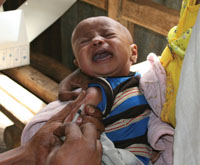Vaccines, immunity and vaccination

Before we can tell you about the vaccine-preventable diseases, you need to understand what is meant by a vaccine. Vaccines are medical products prepared from whole or parts of bacteria, viruses, or the toxins (poisonous substances) that some bacteria produce. The contents of the vaccine have first been treated, weakened or killed to make them safe. If a vaccine is injected into a person, or given orally by drops into the mouth, it should not cause the disease it is meant to prevent, even though it contains material from the infectious agent. Vaccines are given to susceptible persons, particularly children, so that they can develop immunity against the infectious agent (Figure 3.1).
As you will recall from Study Session 1, immunity refers to the ability of an individual to resist a communicable disease. When a dead or weakened micro-organism is given in the form of a vaccine, this process is called vaccination or immunization. For simplicity, in this Module we will refer to 'vaccination', but you should be aware that these two terms are used interchangeably.
The vaccine circulates in the body and stimulates white blood cells called lymphocytes to begin producing special defensive proteins known as antibodies. Antibodies are also normally produced whenever a person is infected with active bacteria or viruses transmitted from a reservoir in the community. Antibodies and white blood cells are very important natural defences against the spread of infection in our bodies, because they can destroy infectious agents before the disease develops. What vaccination does is to stimulate this normal response, by introducing a weakened or killed form of infection, which the white blood cells and antibodies attack.
This defensive response against the harmless vaccine increases the person's level of immunity against the active infectious agents, if the same type that was in the vaccine gets into the body. The protective effect of vaccination lasts for months or years afterwards, and if several vaccinations are given with the same vaccine, the person may be protected from that infection for their lifetime. The Module on Immunization will teach you all about the vaccines available in Ethiopia in the Expanded Programme on Immunisation (EPI), and how they are stored and administered in vaccination programmes.